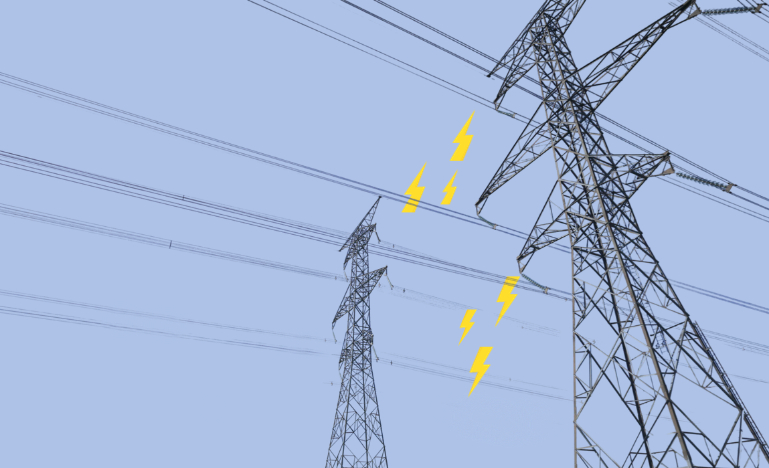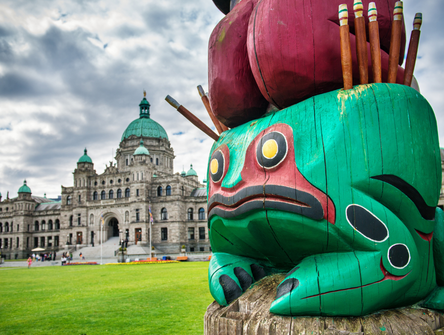Divisions over power
Get ready for yet another challenge over climate responsibility.

When the federal government rolled out draft clean energy regulations in August, Alberta Premier Danielle Smith wasted no time slamming them as "unconstitutional and irresponsible."
"They will not be implemented in our province – period," she declared.
The regulations aim to establish a net-zero electricity grid by 2035 – the foundation for achieving economy-wide, net-zero greenhouse gas emissions by 2050.
Over 84% of Canada's electricity comes from renewable and non-polluting sources. But as more people switch to heat pumps and electric cars, government officials estimate Canada needs to double today's power production to meet future demand.
The draft regulations set a GHG emissions standard on electricity generators by 2035, with an exemption for using fossil fuel-fired units in emergencies. They also allow a limited and decreasing role for fossil fuel generation to prevent large capital assets from becoming stranded and to maintain affordable power rates.
Rural and remote communities that aren't linked to the main grid can also use sources like diesel after the regulations come into effect on January 1, 2025.
Has the federal government exceeded its authority? Under Section 92A (1)(c) of The Constitution Act, provinces have exclusive jurisdiction to enact laws related to the "development, conservation and management of sites and facilities in the province for the generation and production of electrical energy.
Alberta's Environment Minister, Rebecca Schulz, points to restrictions to the province's future natural gas development as cause for constitutional concern, asserting it falls squarely within provincial jurisdiction.Eric Adams, a University of Alberta law professor and constitutional scholar, says the courts will have to weigh in.
"There are arguments on either side, and anyone saying that it's clearly an easy case doesn't have a full appreciation for the ways in which this is going to be a challenging case to think through," he says.
Determining exclusive provincial jurisdiction isn't as straightforward as just referring to one section of the Act. "The Constitution doesn't work like that," Adams says.
Under the 'double aspect' doctrine, provincial and federal governments can legislate on the same subject matter. In this case, while the regulations may impact aspects of electricity generation, which falls under provincial jurisdiction, their true purpose is to address the emissions produced by generation, a federal jurisdiction. "That doesn't make it unconstitutional," Adams says. "That's just the reality of federalism that we live in."
The clean energy regulations are the latest illustration of one of the challenges of Canadian federalism right now: How do we determine the breadth of federal jurisdiction in managing the climate crisis without crossing into provincial jurisdiction?
The regulations create an offense relating to electricity generation. Matthew Keen, an expert in energy regulatory and environmental law at Norton Rose Fulbright in Vancouver, anticipates a legal case that will weigh Section 92A against the national concern doctrine.
He expects Ottawa to rely on the Supreme Court's ruling in March 2021, which upheld the constitutionality of the Greenhouse Gas Pollution Pricing Act. Specifically, the court held that global warming's impacts extend beyond provincial borders, making it a matter of national concern under the "peace, order and good government" clause.
However, the top court has yet to release its decision on the federal Impact Assessment Act, another division-of-powers case.
Enacted in 2019, the IAA grants Ottawa the authority to assess the climate impacts of new resource projects. In challenging the constitutionality of the legislation, Alberta relied heavily on Section 92A, arguing the Act tramples provincial jurisdiction and blocks new energy infrastructure. In May 2022, the Alberta Court of Appeal sided with the province, calling it a "wrecking ball" to the division of powers and a "breathtaking pre-emption of provincial authority."
Keen says the top court's forthcoming decision will influence a challenge against the clean energy regulations.
Still, recent court cases have clarified a few key elements, Adams says. First, the courts accept the reality that governments face a climate crisis.
Any arguments attempting to downplay it or suggest that the government can't address the issue are unlikely to succeed and are at "a dead end."
However, that doesn't mean the federal government has carte blanche to do whatever it wants.
"The court is always going to be looking for ways in which the exercise of federal jurisdiction in the environmental area is actually closely connected to a limited jurisdictional power," he says.
According to Martin Olszynski, an associate professor of environmental and natural resources law at the University of Calgary, the federal government won't be able to rely on the national concern doctrine to uphold the clean energy regulations. Its power will have to be rooted in criminal law, he says, citing R. v. Hydro-Québec, in which the Supreme Court ruled that "stewardship of the environment is a fundamental value of our society and…Parliament may use its criminal law power to underline that value."
Further, the federal criminal law power in no way constitutes an encroachment on provincial legislative power, though it may affect matters falling within the latter's ambit."
The federal government used it to defend regulations mandating that all Canadian diesel fuel must contain a minimum of 2% renewable fuel. In 2016, the Federal Court of Appeal unanimously upheld those regulations in Syncrude v. Canada. "The courts have very clearly said that climate change is an evil that Parliament may suppress with its criminal law power," Olszynski says. He adds that it isn't a slam dunk, but "on the basis of existing case law, the federal government has a better argument than the province."
In challenging the regulations, Olszynski suggests that Alberta's strongest argument would be to rein in the application of the criminal law power on grounds it eviscerates provincial jurisdiction. "That is obviously unchartered territory," he says.
It would also be a steep hill to persuade the country's highest court to revisit well-established principles and legal precedents – more so when it involves climate change, which it has deemed an existential threat.
Olszynski says the current context isn't favorable for the provinces, particularly as their emissions keep climbing.
He hopes that during the regulations' consultation period, which ends on November 2, politicians can steer clear of scare tactics, such as disputed claims by Saskatchewan Premier Scott Moe that the regulations are "unachievable" and would "at least double the power rates."
However, Olszynski expects a new challenge in court and worries that some premiers may refuse to comply even following a ruling that upholds them. They're essentially signaling they'll disregard the rule of law, he says – the normal mechanisms and processes by which these disputes are resolved.
"If the regulations are valid, there is no constitutional space for (this). We stop being a functional country at that point."


